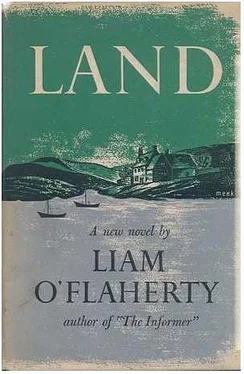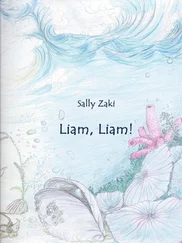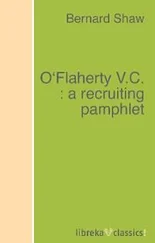Liam O'Flaherty - Land
Здесь есть возможность читать онлайн «Liam O'Flaherty - Land» весь текст электронной книги совершенно бесплатно (целиком полную версию без сокращений). В некоторых случаях можно слушать аудио, скачать через торрент в формате fb2 и присутствует краткое содержание. Город: London, Год выпуска: 2011, ISBN: 2011, Издательство: Bloomsbury Publishing, Жанр: Проза, на английском языке. Описание произведения, (предисловие) а так же отзывы посетителей доступны на портале библиотеки ЛибКат.
- Название:Land
- Автор:
- Издательство:Bloomsbury Publishing
- Жанр:
- Год:2011
- Город:London
- ISBN:9781448203888
- Рейтинг книги:3 / 5. Голосов: 1
-
Избранное:Добавить в избранное
- Отзывы:
-
Ваша оценка:
- 60
- 1
- 2
- 3
- 4
- 5
Land: краткое содержание, описание и аннотация
Предлагаем к чтению аннотацию, описание, краткое содержание или предисловие (зависит от того, что написал сам автор книги «Land»). Если вы не нашли необходимую информацию о книге — напишите в комментариях, мы постараемся отыскать её.
Land — читать онлайн бесплатно полную книгу (весь текст) целиком
Ниже представлен текст книги, разбитый по страницам. Система сохранения места последней прочитанной страницы, позволяет с удобством читать онлайн бесплатно книгу «Land», без необходимости каждый раз заново искать на чём Вы остановились. Поставьте закладку, и сможете в любой момент перейти на страницу, на которой закончили чтение.
Интервал:
Закладка:
“You mustn’t be nervous of him, child,” he said. “He is by no means savage. Quite the contrary. After all, you should be used to entertaining revolutionaries. The most famous of them came to our house in Paris. You should know by now that idealists, even those who resort to violence, are usually the most gentle among human beings.”
“I know that, Father,” Lettice said, blushing still more deeply.
“I like O’Dwyer,” Raoul said as he walked out of the room. “Father Kelly is also a person of extraordinary quality.”
He was too preoccupied with his ideas to notice that it was not fear of again meeting O’Dwyer that startled his daughter and made her blush. Elizabeth had been just as insensitive to the first tender throbbing of a young girl’s heart, when Lettice had entered the living-room after leaving the empty jug in the kitchen on the day of the shooting. It was shyness of a new and strange emotion within her own breast that had startled Lettice, now as on that other day.
During the past month, she had experienced this emotion many times. It came upon her suddenly, unassociated with an image or memory of any sort, in her room, walking by the river among the wild daffodils, watching the waves rise and fall by the lighthouse rock. It had come to her in Elizabeth’s room, while she was looking at the rainbow. It had no name, no voice, no substance. It was the awareness of beauty still in the womb, at whose door life is waiting with a key for the moment of birth.
Yet she looked perfectly composed when she sat opposite her father at table in their little dining-room, with O’Dwyer on her left and Father Francis on her right. Raoul maintained that one of the greatest achievements of French culture was its success in teaching women the art of entertaining guests. He had taken great pains with his daughter’s education in that respect. So that she had been already an accomplished hostess at sixteen. Since conversation was her father’s chief delight in life, she got plenty of practice in the years that intervened. That was why she was now able to look so composed, even while her heart fluttered because of the young man’s presence.
When the meal got under way, she began to examine him shyly. She realized at once that he was entirely different from all the revolutionaries that came to their house in Paris. All those other men did not seem at all dangerous; not even a man with such a reputation for violence as the Russian Bakunin. On the contrary, she found them pathetic, especially when they boasted of their sufferings. This young man’s very presence in the room was frightening in some mysterious way. Even when his face lit up in a smile he still looked dangerous.
Everything he did fascinated her. Yet he did most outrageous things. He interrupted the conversation of the older men whenever he felt inclined. He would stop speaking suddenly and stare at the ceiling. His gestures were brusque. A sudden movement of his muscular body would put his clothes out of shape, as if a savage impulse in him sought to tear off their constraint.
What interested her most was the fact that he completely dominated the two other men. She had never before seen her father submit to the power of another man’s personality.
When he finally spoke to her, her composure vanished and she had to lean far back out of the lamp-light, in order to hide her blushes.
“ I remember you,” he said.
As she bowed in answer to his remark, she felt thrilled by the tenderness of his voice. When speaking to the others, his voice sounded harsh. Now it was tender.
“I hope I didn’t frighten you that day,” he continued.
“Not in the least,” she said.
“You must have thought I was a disgusting fellow,” he said, “when you saw me stagger into your kitchen, with blood streaming down my face and a revolver in my hand.”
“Disgusting?” said Lettice seriously. “Why should I think so?”
Instead of answering her, he turned away suddenly, looked at the ceiling for a few moments and then spoke to Raoul. If another person had behaved like that towards her, she would have felt extremely hurt. Yet his rudeness merely increased the peculiar feeling of elation that his presence inspired in her. Later, when he again spoke to her, although twenty minutes had passed, she was unaware of any interruption to their conversation.
“Your voice is like music,” he whispered, bending close to her. “Do all French women speak like you?”
“But I am not French,” Lettice said. “I was merely born in France. I am Irish.”
He laughed, looking her straight in the eyes.
“Of course,” he said, “you couldn’t be anything else with that light in your eyes. It was your French accent that led me astray. I had an American accent myself when I came home.”
“Were you long in America?” Lettice said.
“Five years,” he said. “I went to look for gold in Nevada and California.”
“Did you find any?” said Lettice.
“Enough for my purpose, I hope,” he said.
“I have heard that California is beautiful,” said Lettice.
He stared at her in silence for a little while.
“Beautiful?” he said at length. “Cape Horn is beautiful. I went from San Francisco around Cape Horn on a sailing ship, when I was coming back to Ireland. We ran into icebergs. Then there was a storm that lasted three weeks. Eight men of the crew were killed. We had only a foremast left on our ship. Do you like the sea?”
“Yes,” said Lettice.
“When the fine weather comes,” he said, “I’ll take you sailing in my boat. I must go now.”
Lettice and Raoul went into the living-room after the two guests had gone. Lettice threw herself down in a corner of the sofa and put her hands behind her neck. Raoul paced the floor. They were silent for some time. Then he halted in front of his daughter and stared at her.
“What do you think of O’Dwyer?” he said.
“Why do you ask, Father?” Lettice said.
“Because I value your opinion,” Raoul said. “I have made an important decision. I want to know what you think of him, simply because you are less decadent than I am. You are closer to the earth, with a clearer understanding of a primitive creature like O’Dwyer.”
“Primitive?” said Lettice. “I don’t think him at all primitive. He gives that impression superficially, simply because he is unique, judged by our standards. I mean that he creates his own world and his own laws.”
“Very good,” said Raoul, touching his beard. “I am delighted to hear you say that.”
“He sees beauty only in danger,” Lettice said.
“How did you arrive at that conclusion?” Raoul said.
“I asked him if he thought California beautiful,” Lettice said, “and he looked astonished, as if the word ‘beautiful’ were unknown to him until that moment. Then he said that Cape Horn was beautiful, simply because his ship nearly foundered there in a storm.”
“Excellent,” said Raoul. “Danger is to him what tragedy is to a poet, the ultimate beauty. You have convinced me that I was right in thinking that he is a born leader of men.”
His expression, which ordinarily looked cynical, now became humble and even tender.
“Tell me, Lettice,” he said, “if you are angry with me for bringing you to Manister.”
“I couldn’t possibly be angry with you, Father,” Lettice said. “I love you.”
“Yes, yes, child,” Raoul said irritably, as he began to pace the floor once more. “In spite of that, you could regret being forced to live in this dreary and remote village.”
“I’m very happy here,” said Lettice.
“I’ve reached an age at which the intelligent man eschews the external world as much as possible,” Raoul said, “but you are a flower opening its petals to the beautiful warmth of emotional life. I’ve had qualms of conscience about dragging you to this barbarous place.”
Читать дальшеИнтервал:
Закладка:
Похожие книги на «Land»
Представляем Вашему вниманию похожие книги на «Land» списком для выбора. Мы отобрали схожую по названию и смыслу литературу в надежде предоставить читателям больше вариантов отыскать новые, интересные, ещё непрочитанные произведения.
Обсуждение, отзывы о книге «Land» и просто собственные мнения читателей. Оставьте ваши комментарии, напишите, что Вы думаете о произведении, его смысле или главных героях. Укажите что конкретно понравилось, а что нет, и почему Вы так считаете.












